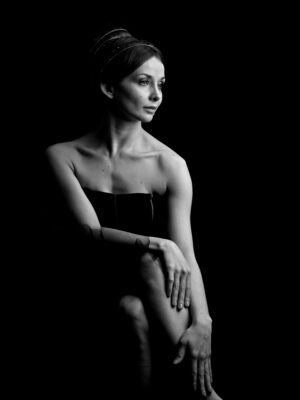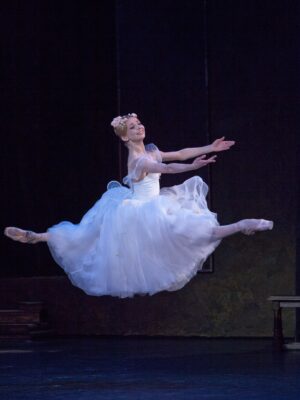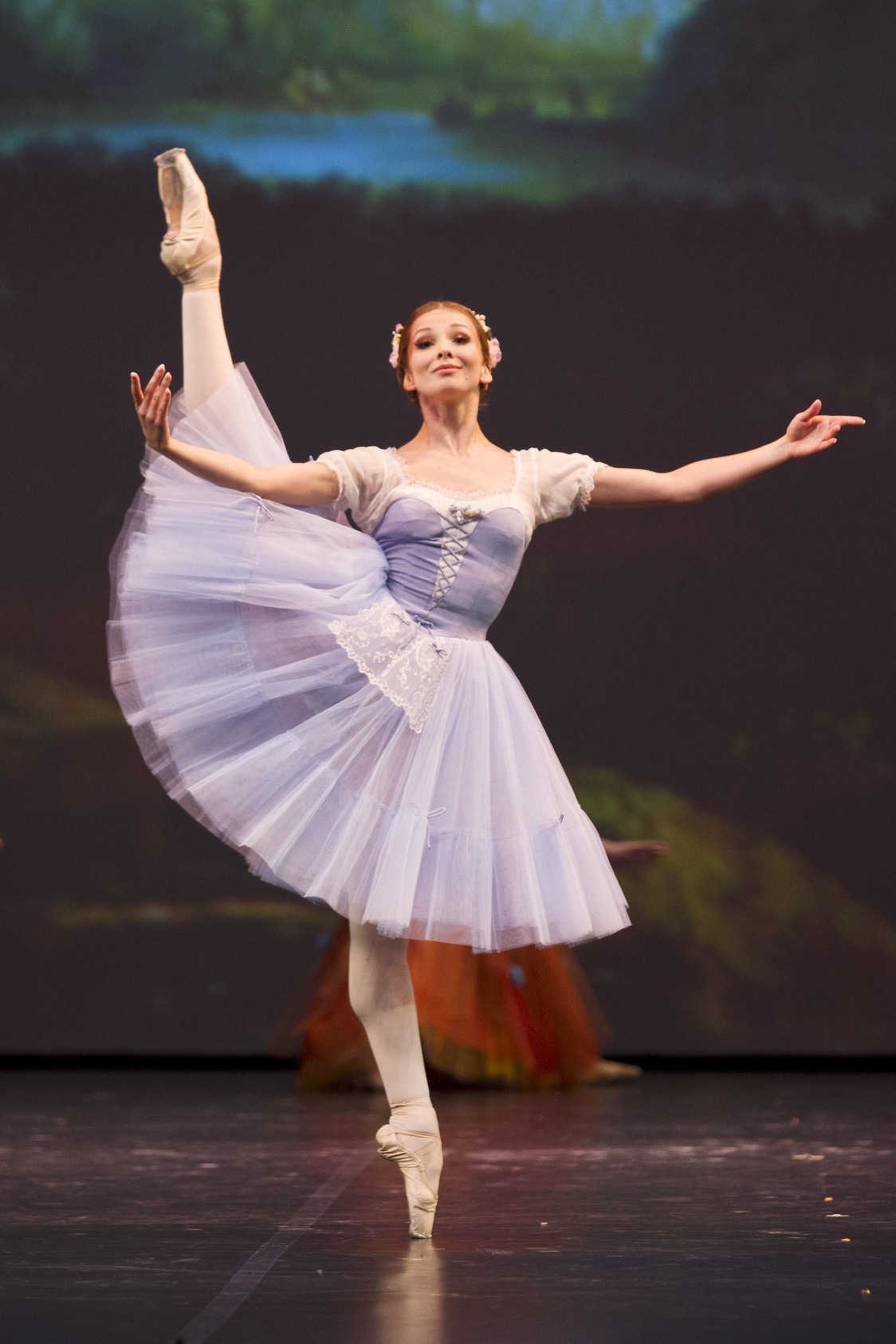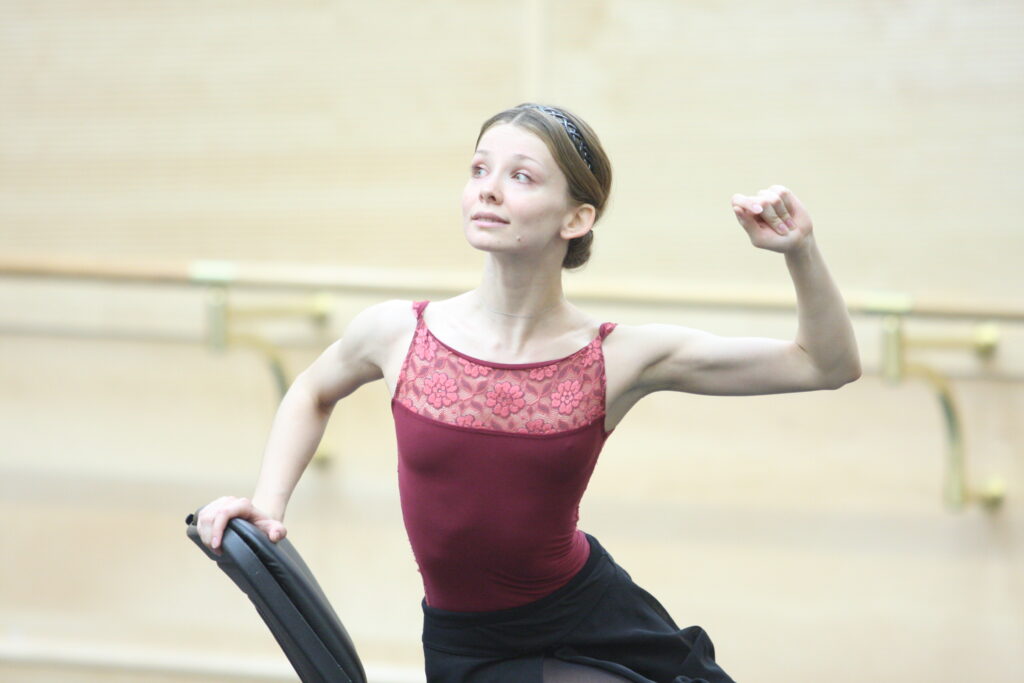Evgenia Obratsova, the darling of the ballet world and idolised by many, is not just a film actress but an accomplished ballerina and mother of two. From her experiences inside the halls of the Vaganova Academy, through her years at the Mariinsky, and now, her status as a prima ballerina at the Bolshoi, Obratsova discusses her life, career transitions, and dreams with VaganovaToday.
 You were born in Saint Petersburg, and your parents were involved in ballet. How did you become involved in it?
You were born in Saint Petersburg, and your parents were involved in ballet. How did you become involved in it?
My parents both danced at the Maly-Mussorgsky Ballet Theatre (now the Mikhailovsky) in Saint Petersburg. My mother graduated from the Vaganova Academy in the class of perfection under Natalia Dudinskaya and my father graduated under Anatoly Nisnevich. They decided I should start ballet and sent me to the Vaganova Academy and I was accepted, so at first it was their initiative.
When did your own desire to dance appear?
During my second year at the Academy the desire to dance arose, I set some goals for myself and decided to forge ahead.
My first grades had not been great because I didn’t have the desire to be there, but after I understood what my profession involved and what it was all for, then I had my first successes and accomplishments, further progressed and became a hard worker.
 What were your first impressions of the Academy?
What were your first impressions of the Academy?
The Vaganova Academy was a place where we were raised very strictly. I always entered the building with worry and some degree of fear. I don’t know if that is still the case today, but when I studied there we had an atmosphere of very strict upbringing and a lot was demanded of the students. For me, during the entire 8 years that atmosphere persevered.
And when you shifted to the Mariinsky Theatre?
Of course it was a different world where we had to start everything from the beginning, and our previous successes did not hold the meaning we thought they would. The top graduating students in essence became corps de ballet members, we had to study a new repertoire, and found ourselves in a theatrical atmosphere…. there were a lot of impediments. But this “school of life” is necessary, and every successful graduate from the Vaganova Academy has a huge desire to join the Mariinsky Theatre. At least that was the case for me at that time.
And your work with Ninel Kurgapkina in the theatre began immediately?
Yes, just a few weeks had passed when the artistic director at the time, Makhar Vasiev, told me I was going to work with Ninella Alexandrovna (Kurgapkina). On that day I had my first rehearsal listed on the daily schedule with her. It was a rare case at that time for a dancer to be given to such a specialist as Kurgapkina from [m very] first year in the troupe, because at that time Kurgapkina, [Olga] Moiseyeva and [Gabriela] Komleva were the most desired pedagogues to work with. All the younger ballerinas wanted to work with them, but far from every dancer was taken under the wings of these pedagogues. They had to evaluate the dancers themselves. For me, of course, it was a great honor that Kurgapkina chose me, agreed to work with me, and that Vasiev made that decision. I think it was a very significant step.
 What did she focus on and what specific knowledge did she impart?
What did she focus on and what specific knowledge did she impart?
Ninella Alexandrovna focused on academicism, purity of execution, expressiveness, the position of legs and arms. This was all very important and very much needed, especially in the first stages of my development in the theatre. She rehearsed very strictly, was very nit-picky and fastidious. We prepared my first ballet for a long time, Romeo and Juliet, we rehearsed it for about a year, Legend of Love we prepared for about six months and Sylphide also for about six months. These were veritable working processes that were required, and they created the ideal basis for my future existence in these roles. Because if you prepare them otherwise, they will never retain the proper quality of execution, something will be wrong, and even after 20 years they will not be correct because the foundation is never there if it isn’t prepared correctly. I feel now even today how correctly I prepared Legend of Love, because it seems one of the most simple productions to me, and dancing Shirin is so easy, although many say that Shirin is one of the hardest roles. But it sits in me so strongly, what I learned with Kurgapkina, that for me it is easy, I don’t understand what could be difficult about it. I could dance it now without preparation.
You also prepared Juliet with Kurgapkina and many consider it to be “your role”. Can you comment on it?
It has remained my first and favorite role, I prepared it for a long time and worried a lot about it. But for me it is a role, not a performance from a technical point of view. Of course it is a story that you have to tell honestly and the music has to be felt and you have to carry it inside you and approach it from all angles with care. It was my first and most poignant role. There are various versions of Romeo as we know, including Macmillan’s version, but the character is the same, just the sets and costumes and some nuances are altered, but it’s not a cardinally different production. I enjoy both the Lavrovsky and Macmillan equally, I love them both, it’s just that Lavrovsky was my first.
When Kurgapina passed, did that affect your decision to leave the Mariinsky Theatre?
Most likely it didn’t influence me because I had begun to work with Ella [Elvira] Tarasova after that, and I was her student. When I left the Mariinsky, to be honest what I worried about most was leaving her, so nothing had really changed in terms of teaching and coaching. Tarasova and I had a great working relationship, and I left for completely different reasons, but the fact that I had to leave my work with her concerned me the most.
 How did you end up at the Bolshoi?
How did you end up at the Bolshoi?
By invitation of Anatoly Iksanov, the general director at the time, on 30 December 2011. It was a really alluring invitation with, what seemed to me, a great deal of perspective. I was not mistaken in that it turned out to be so.
Many theatres retain the concept of emploi to date, and although you’re a prima at the Bolshoi now, the Mariinsky did not give you Swan Lake to dance while you were there. Is this a case of emploi? Should emploi influence what roles a dancer is given? Does height affect it?
Height doesn’t affect what roles you receive at all. To be honest, I never asked to dance Swan Lake at the Mariinsky, I never had a burning desire to dance it, I have no aspiration to dance every role in the repertoire. So, to me, it’s not surprising that they didn’t give it to me. There are productions that don’t hold much meaning for me, including Swan Lake at the Mariinsky, I didn’t feel a need to dance it, and the same applies for Le Corsaire. If they were to offer it to me, maybe I’d dance it, but I can’t say these ballets are at the top of my list to dance.
Concerning emploi, I think it remains subjective and in fact it’s not clear what it means today. If previously there were clear definitions in terms of roles and typecasting, then today in the world everything has been mixed together such that I consider it doesn’t exist, or else it exists only according to certain individuals — some consider a role should be cast based on external appearance, others look for technical or acting reasons, but for me it’s not understandable. In my opinion, if an artist is convincing in a role then his hair color or height doesn’t matter, the most important is that the role is prepared well and each has his own individuality and nuances.
How is the atmosphere at the Bolshoi compared to the Mariinsky?
At the Bolshoi people are more open, more friendly, and I like it more here in terms of the simplicity of interaction with others. Here, aside from my work, I do not spend time on other tasks, whereas at the Mariinsky I was interrupted a lot with other tasks, administrative items, problems of another nature that disturb an artist. Little things, I had to handle other activities more frequently there.
Are there roles you wish to dance?
Yes, Manon. For me this production and role is interesting from the point of view of acting, it is an interesting role and character and offers a huge scope for creativity and artistry. Macmillan is one of my favorite choreographers. I love a lot of others too though, but if I were to list them all…
Have you noticed changes in the development of ballet over the course of your career?
That is really difficult to evaluate, because things are constantly changing in the world, there is no such thing as a sudden increase or development or sudden decrease… people dance well now and there will always be plusses and minuses. Technique is progressing, but technique has never been and never will be the sole basis for ballet. As for the basis of ballet, it is the aggregate of academic-ism and expressiveness, and such artists who have both of these are rare. If everyone danced well it would probably be boring. So a certain fascination lies in the search for talent, and that’s a good thing.
How do you feel living in Moscow?
I love Moscow, I’ve become used to it, I’m comfortable here and it is my home now. I like the city, both the center and the outskirts. Everything about it is close to me now, I don’t feel discomfort here, plus we are in the very capital of Russia.
You have twin daughters now, how do you combine the role of mother and prima ballerina?
Just like everyone else, I work and all my free time I spend with my girls. I have help at home while I’m not there of course.
Do you want them to dance?
I can’t say yet — it will depend on their capabilities after I can get an idea if they have the traits needed to dance, and also it will depend on their own desire to dance. But I think that dancing is useful for anyone.
Do they go with you on tour?
No, I don’t take them with me, I consider the change in climate and long flights to be harmful for children of their young age. I think it’s better if they stay here. But I don’t go away for long periods of time on tours yet, so I think it’s still early to take them with me. As they get older, we will see if that changes.
Do you cook? Favorite dishes?
I rarely cook, only when I have time. My favorite dishes are the most simple ones that I can prepare myself, such as blinis or cottage cheese pancakes. Our favorite family dish is quick pasta, which everyone likes.
How do you spend free time, how do you relax?
It always depends on the circumstances, if there is truly free time and no work is distracting me then for me relaxing is swimming in a pool or go to the banya or sauna. Water-related procedures really energize you well, and help restore your strength.
What’s the best part of your job?
It’s hard to say because sometimes rehearsals bring a great deal of joy, but sometimes you get tired of them and are looking forward to performing on stage, then the time to enter on the stage arrives and you go out and that becomes the most wonderful part of your job. It depends on what you’re preparing, for how long, and what condition or state you are in. But of course we do everything for performing, that is the focus, so of course performing and going out on stage are the center of my profession.
What are your dreams for the future?
For me, dancing new productions or premieres are always interesting, to add to my repertoire of roles. Or to travel to theatres where I’ve been in the past and I would like to return to, and to my favorite stages. To do interesting productions there. I would love to return to the Grand Opera de Paris, I really love Covent Garden, I’d also like to return to La Scala and Vienna State Opera stages.
What is the hardest part of your job?
The daily routine of daily work. You’re constantly in a state of preparation. Even the rare time outs we have will come to an end at some point, and then you have to start work again. And that’s probably the hardest part. Because in this profession you can’t allow yourself to rest for more than 1-2 days, or else you lose shape and returning to it again is really hard. So the daily work is difficult, but without it you can’t be in this profession.
Photo credits: portrait and image of Giselle, courtesy of Evgenia Obratsova. Rehearsal shot by E. Fetisova.
La Sylphide photo by Mikhail Logvinov.
Photos courtesy of the Bolshoi Theatre press office.